- Home
- Lou Cameron
Renegade 36 Page 4
Renegade 36 Read online
Page 4
He grimaced and said, “Sure, right on top of the fuel tanks, just in case they don’t put a four-incher right in my lap. I’ve smoked up an armored vessel or two in my time, babe, given surprise and the drop on my side. But they ain’t about to come within machine gun range before they open up with their big guns.”
As if to prove his point, sunset-pink cotton blossomed as the distant vessel’s superstructure rose above the horizon. The sound and the four-inch shell caught up a little later. Fortunately, the shell sent up a geyser of pink foam a good hundred yards down their wake.
Gaston said, “Sacré goddamn! They are shooting to kill on sight! Are you flying a Cuba Libre banner I fail to see from here, Esperanza?”
She said, “Of course not. They fired on us on sight this morning as well. They must have a picture of my poor Nombre Nada, no?”
Captain Gringo had to think about that. He said, “Aside from her paint job, this schooner’s a pretty fair imitation of any other in these waters, no offense. In this light any paint job ought to look much the same as any other. So how do they know who they’re shooting at?”
The gunboat fired again. Gaston had time to say, “Eh bien, they know!” before the shell landed off their starboard bow, close enough to shower everything and everyone on deck with spray. The helmsman shouted, “It is no use! We must heave to before they blow us out of the water, Capitana Esperanza!”
Gaston shoved him away from the wheel. He didn’t argue. He was running forward, announcing they were doomed, by the time Gaston had them zigzagging, toward the gathering dusk to the east. Esperanza said, “They are gaining on us! You are not helping at all by steering that way, Gaston!”
Then a shell landed right where they would have been had Gaston not swung the wheel hard over as he saw the telltale cotton ball in the distance. So she told him to forget what she’d just said.
But each round came nearer, despite evasive action, as the Spanish gunboat closed the distance between them. Captain Gringo stared aft at the billowing smoke cloud against the sunset. He said, “That’s damned fine shooting in this light. I can barely see them now that the sun’s almost down. So how the hell can they see us so good against an even darker skyline?’’
“They see us!’’ sighed Gaston as another round screamed over them between the masts and through the sails, had the sails been up.
But the deadly shelling was at least less frequent now. The enemy gunners were taking more time, for whatever reason. Captain Gringo began to count between shots, and they took a good thirty Mississippi’s to get the range again each time Gaston changed course.
The helmsman who’d run off came back. He was not alone. The four-man delegation announced they’d had enough and demanded Esperanza surrender while there was still time.
The big Basque beauty snapped, “The time to kiss the King of Spain’s foot was before you signed on, muchachos! Do you think they would let you live if we gave up?”
José said, “At least it’s a chance! We shall die for certain if they sink us!”
Another man sighed and said, “I do not know for how to swim either.”
Esperanza turned to Captain Gringo and said, “I left my pistol in the stateroom. Would you please shoot them, Dick?”
Captain Gringo said, “I’ve got a better idea. José, I want all hands on deck. Now. We’ve got some canvas to hoist. Esperanza, can we cut your engine from up here?”
She said, “Of course, the throttle is right there, to the port of the helm. But if we move any slower, Dick—”
He cut in to say, “Kill the engine, Gaston. What are you others waiting for? Get those fucking sails up, poco tiempo!”
He drew his .38 to speed them on their way. But they were already moving, and Gaston simply had to move the brass throttle handle to kill the engine. As the screw stopped churning under them, the low-slung, overladen Nombre Nada began to slow down. So the next shell landed in their wake close enough to drench the three of them, and Gaston asked, “Do you think that was a wise move, Dick?”
Captain Gringo replied, “We’ll know in a minute. Esperanza, you know more than I do about moving your crew and this vessel under sail. Do it. I want us moving close hauled, sou’ sou’east for now.’’
Esperanza didn’t argue. She started shouting orders. It was so dark now Captain Gringo had to take it on faith when she said all sails were set. Black sails against a black sky didn’t offer much of a view. Another shell landed back where they’d been. The gunboat was running with her lights showing. So when it crossed their wake a few minutes later, firing blindly dead ahead, Gaston said, “Eh bien, mais how did we do that, Dick?’’
Esperanza laughed and said, “Silly, they can’t see us down this way. Let us put some more distance between us and the cruel beasts before we turn about and make for Cuba again under full sail and power!’’
Captain Gringo said, “Sail, sí. Power, no. Not until I have a look at your engine room, querida. They were firing blind at us at least five minutes before they started missing regular. They must have a Marconi set on their bridge.’’
Both Gaston and the girl seemed surprised. Gaston knew more about modern warfare, of course, so he said, “I have heard one can range on a distant radio transmitter by moving one’s own spider web about. Mais we were not sending them any dots or dashes, were we?’’
Esperanza said, “Of course not. I have no radio equipment aboard La Nombre Nada. For how could they have been tracking us with their own, Dick?’’
Captain Gringo said, “That’s one of the things I want to see about below. If my hunch is wrong, we have a spy aboard.”
They didn’t have a spy aboard. At least, not with his own sneaky radio gear. Esperanza watched, holding a carbide lamp to shed some light on the subject, as Captain Gringo inspected the big four-banger marine engine. He told her, “Every time there’s an electric spark, it sends out a radio wave. That’s how come there’s so much static and why Marconi can’t get his invention to pick up signals more than say fifty miles away yet.”
Esperanza said she didn’t know anything about such mysterious new inventions. Captain Gringo said, “Someone aboard that Spanish gunboat does. They were homing on the spark plugs of this engine, see? When you suddenly put in to a mangrove swamp this morning you naturally killed your engine and they naturally lost you. They must have cruised around in a lazy-eight search pattern out to sea until we put out again and they picked up your spark plugs.”
“Is such a thing possible, Dick? How could they be sure they had the right vessel, even if it is? I am not the only person in the world who has internal combustion, you know.”
He said, “I’m still working on that. Maybe each engine sends its own distinctive signal. I graduated from West Point before Marconi was in business, so I’m no expert. But it does seem odd they could pick us up at such a distance. These plugs are sparking inside an engine block below the waterline, and even when he’s trying, Marconi can’t send his mystery waves more than a mile or two without an antenna. Hand me that light, will you? I see something down here in all this grease. Looks like some kind of a ground wire. Why would anyone want to ground an internal combustion engine mounted on mahogany timbers?”
She said she had no idea as she handed him the carbide lamp. He traced the innocent length of copper wire into the crack between two floorboards and muttered, “Shit.” Then he somehow got between the engine block and bulkhead, holding the light high as he probed with his pocket knife. He found it on the fourth try. He yanked the length of wire out into view and said, “Yeah, this runs straight up. It must go through your decks to one of your shrouds.”
Esperanza leaned closer, saying, “All this trouble because of one little copper wire, Dick? It looks so harmless!”
He broke it, saying, “It is now. It was supposed to look harmless. That’s why nobody ever reported it to you, even if they noticed a hair-thin copper wire spiraling up a shroud line. If it’s imbedded in the hemp under tar, I don’t think I could t
race it now, and I know it’s there.”
As he rejoined her, Esperanza protested, “I was most careful in the signing on of extra hands for this voyage. Yet you say I have a spy aboard, Dick?”
He shrugged and replied, “If you do, he must enjoy swimming a lot. That gunboat wasn’t out to capture us. It’s following search-out-and-destroy orders. Your engine was probably wired to commit suicide when they installed it. So who installed it, and where?”
She said, “Maracaibo. That is where I also picked up the supplies for Garcia. I thought Venezuela was in the Yankee sphere of influence.”
He said, “It is, if it knows what’s good for it. Cleveland just stopped the Brits from expanding British Guiana a lot. On the other hand, it’s easy enough to sneak a British agent into what I assume was an English-speaking outfit. I know the old Spanish saying about three people being able to keep a secret if two of them are dead, doll. But I still want you to tell me who’s backing this play.”
She said, “I have no secret from you, toro mio. A syndicate of Yanqui businessmen, fronted by a member of the New York Yacht Club, contracted with me for to smuggle this shipment to Garcia. I got the impression they have others in mind for the Cuban rebels, if this one gets through.”
He unfolded the screwdriver blade of his knife and got to work on the engine timing as he muttered, “Okay, there’s no mystery about why big business in the States would rather deal with an independent Cuba than the corrupt and quixotic Spanish Empire. But how come they have you running the guns from this direction? Cuba’s only eighty miles or so from the Florida Keys, for Pete’s sake.”
She nodded and said, “Sí, and the Spanish Navy patrols the waters between, in force, day and night. My employers thought, and I agreed, they would be less apt to expect a landing along the south coast. So they sent their so-called farm machinery to Venezuela aboard a yanqui tramp and recruited me for to deliver it the long, slow way around the Spanish Navy. What are you doing to my new engine, querido?”
He said, “Resetting the timing. I thought it was running a little rough. I don’t think anyone can pick up your spark plugs with a radio receiver more than a mile or so away now that we’ve cut the antenna. But it’s better to be safe than sorry. If they do stumble over us in the dark, they may not be as sure who they’re firing on. The wiseass who wired your engine to broadcast its firing pattern timed it to fire in a distinctive pattern as well. Your engine crew should have caught the rough timing, Esperanza. Maybe we ought to have a chat with them.”
She said, “Pero I have no particular hands assigned for to run this engine, Dick. As you see, it must be hand cranked down here for to start. Pero the controls are topside, by the wheel. The people who installed it told us how to run it. When I wish to use auxiliary, I simply send anyone handy down here for to turn the crank over.”
“Oh boy. You mean you have nobody trained to fix it if it breaks down on you at sea?”
“They guaranteed it would run smoothly as far as Cuba, Dick. In any case, I have you for to repair anything that breaks now, no?”
He grimaced and said, “Yes and no. I’m an ordnance officer, not a horseless-carriage mechanic. It does seem like a rugged hunk of machinery, but ... Who told you you didn’t need a mechanic aboard, Esperanza, the same helpful guys who installed it?”
She nodded and said, “Sí, a Señor Wetzel, who has for some time been running a shipyard in Maracaibo. He is Yanqui too. That must be for why the others hired him, no?”
“Sure, they must study international intrigue a lot at the New York Yacht Club. That’s how the Brits were able to pass on the news to their Spanish allies that La Nombre Nada was sneaking up the Mosquito Coast with an engine broadcasting in three-quarter time. We’d better have a look at your charts now, doll.”
She frowned and answered, “Charts? I don’t need no charts. All I got to do is run up the coast as far as Cabo Gracias a Dios, steer east as far as longitude eighty, and follow her north for Casida, on the south coast of Cuba. Behind Casida rises San Juan Hill, and atop the crest will shine a beacon fire if it is safe for to put in at a cove to the east of town.”
He shrugged and said, “You know these waters better than me, or, come to think of it, just about anyone. But who else have you told about your navigational plans, Esperanza?”
She said, “Nobody in detail. When they told me in Maracaibo that the rebels were not yet ready for to take any cities, but held San Juan Hill and the surrounding jungles, I simply said I knew how to get there. I have been to Casida before.”
“Did you tell anyone you meant to follow the Mosquito Coast as far as you could?”
“Oh, Dick, everyone knows a shallow-draft gunrunner hugs the coastal shallows as much as possible.”
He nodded but said, “Let’s not and say we did this time. That Spanish vessel will be sweeping to the west now that they’ve lost us. If we put about and make for Cuba well out to sea, we can make an end run around them before we need to use this engine again.’’
She shook her head and said, “I do not like it, Dick. Is true we are safe enough out here under cover of darkness. But to be out on the high seas in broad daylight is asking for trouble, even if this engine should not break down, no?’’
He said, “We’re already in trouble. What’ll you bet the Dons have other gunboats off Cabo Gracias a Dios and all points in between? They won’t expect us to come up longitude eighty bold as brass. Cuba is what, seven hundred miles long?’’
“Something like that. I am not familiar with your yanqui miles. Pero Spain has a most large navy and—’’
“And if the dog hadn’t stopped to sniff, he’d have caught the rabbit,’’ Captain Gringo cut in, adding, “We’ll make better time the short way, with the trades almost abeam. We know for sure they’re expecting us to haunt the shallows most of the way, so—’’
“Pero Dick, if we are caught out in the open after sunrise by anything with more speed and guns...’’
“We’ll be in a hell of a mess,’’ he agreed. Then he kissed her and asked, “Where is it engraved on stone that gunrunners can’t take risks, Esperanza? You stuck your pretty neck out when you agreed to run this cargo to Garcia. At least my way gives us a fifty-fifty chance.’’
It seemed to be working as the sun rose above the clear horizon into a cloudless sky of cobalt blue. Nombre Nada had the Caribbean all to herself as far as the lookout’s eye could see. She was moving on full sail alone, thanks to the favorable trades. Far off to the west a Spanish radio operator was straining his ears without much luck as the gunboat searched for the gunrunner along the Mosquito Coast. They were too far from Cuba to radio they’d lost contact with La Nombre Nada, given the current state of the art. But of course El Cid, cruising off Cabo Gracias a Dios, would no doubt pick up the signals if the thrice-accursed gunrunner had somehow gotten by them with its engine silenced. It would have to use its engine again to claw off the cape directly into the trade winds, no?
In Havana, Butcher Weyler didn’t have to be told the gunrunner had given his first line of interception the slip. The wily royal governor was a man who believed in defense in depth. As an aide answered his summons that morning, Weyler said, “I just got a cable from our friends in Maracaibo. They just found out the rebels intend to signal from San Juan Hill if the coast is clear. Perhaps you can tell me how it is that unwashed rebels have occupied a height overlooking an important Cuban harbor, Colonel?”
The junior officer smiled and said, “They did not occupy it long, my general. Is true they had a gang atop the hill for a time. As soon as our forces in the area noticed their indiscreet campfire smoke, they of course retook the high ground, with few casualties on either side. The ragged rebels did not put up much of a fight.”
Weyler said, “That is because they have few guns and almost no ammunition. I wish to keep it that way. You are certain we hold San Juan Hill and that we can keep it, Colonel?”
“Sí, no problem, my general. We have fortified the crest an
d cleared the brush from its slopes. It would take a determined assault by better troops than Garcia has for to even worry the defenders atop San Juan Hill now. They also have a clear field of fire at the harbor entrance with their mortars, so—”
“Fuck the mortars and wire the eastern command to get some long-range field guns up there,” Weyler cut in, adding, “After dark, until further notice, I wish to have a beacon fire lit atop San Juan Hill.”
The aide started to ask a dumb question, but, like Weyler, he was one of the few Spanish officers who’d gotten their promotions on ability rather than court connections. So he nodded and said, “Sí, if the gunrunner thinks the coast is clear, it will no doubt come a bit closer to our guns, no?”
Weyler shook his head and said, “They won’t put in at a main port. They will no doubt make for a cove to the east or west. I want all such possible landing sites covered a good fifty kilometers in either direction. See to it, Colonel. Now I must telephone the admiral and see if he would like to post a few sea sleds over that way for to cut off any possible retreat, should the gunrunner elude our shore fire.”
As the aide turned to go, Weyler had an afterthought and asked, “Have you anything to tell me about that Englishman, Churchill?”
The aide shook his head and said, “The young reporter should be arriving at the front by rail anytime now, my general. He has not given us any trouble. He seems to be what they call a good sport about the minor discomforts of an army on the move.”
Weyler shrugged and said, “Really? I thought, on meeting him the other evening, he was a mama’s boy. He can’t be shaving more than once a week yet, and he certainly looked silly in that pith helmet and those fancy riding breeches. I hope we can keep him alive until this nonsense with Garcia cools down. I have read the first dispatches he cabled home about our civil war. That is what he calls the execution of bandidos, a civil war. But I must say he was most flattering to us. So let us make sure he keeps up the good work.”

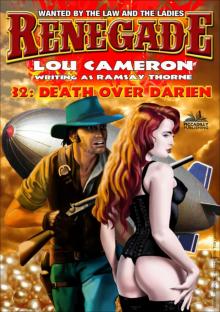 Renegade 32
Renegade 32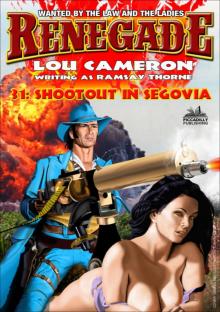 Renegade 31
Renegade 31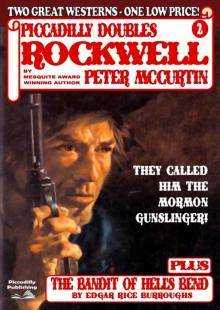 Piccadilly Doubles 2
Piccadilly Doubles 2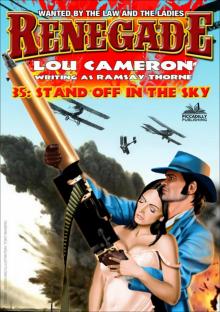 Renegade 35
Renegade 35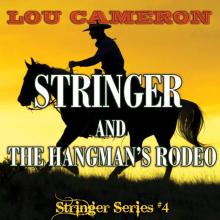 Stringer and the Hangman's Rodeo
Stringer and the Hangman's Rodeo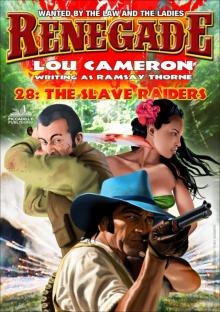 Renegade 28
Renegade 28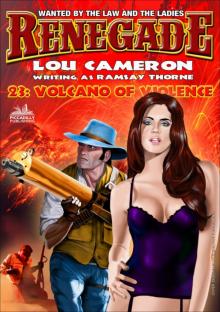 Renegade 23
Renegade 23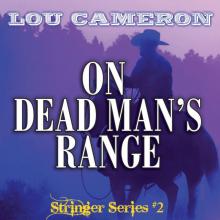 On Dead Man's Range
On Dead Man's Range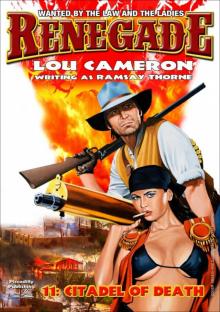 Citadel of Death (A Captain Gringo Western Book 11)
Citadel of Death (A Captain Gringo Western Book 11)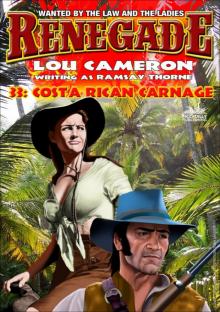 Renegade 33
Renegade 33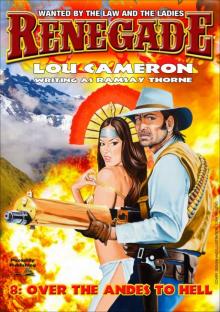 Over the Andes to Hell (A Captain Gringo Western Book 8)
Over the Andes to Hell (A Captain Gringo Western Book 8)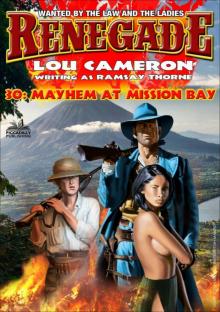 Renegade 30
Renegade 30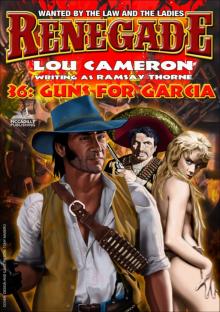 Renegade 36
Renegade 36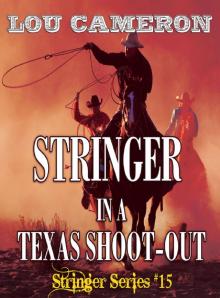 Stringer in a Texas Shoot-Out
Stringer in a Texas Shoot-Out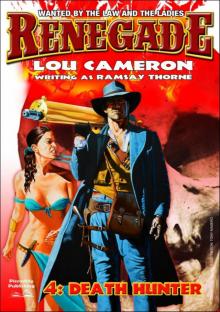 The Death Hunter
The Death Hunter Stringer and the Wild Bunch
Stringer and the Wild Bunch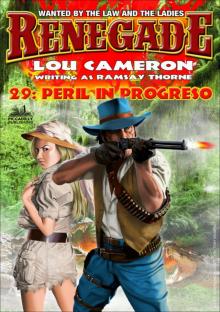 Renegade 29
Renegade 29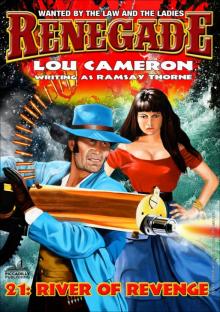 Renegade 21
Renegade 21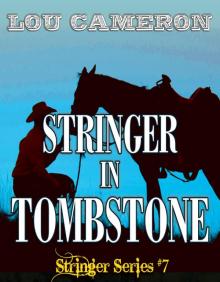 Stringer in Tombstone
Stringer in Tombstone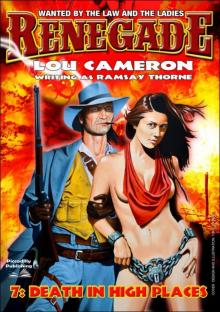 Death in High Places (A Renegade Western Book 7)
Death in High Places (A Renegade Western Book 7)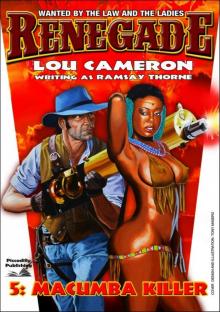 Macumba Killer
Macumba Killer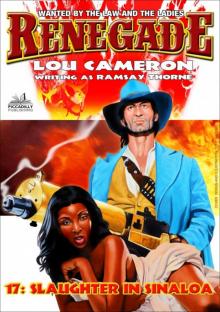 Renegade 17
Renegade 17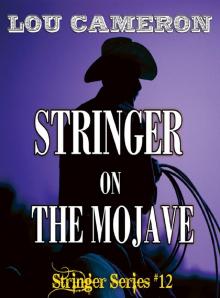 Stringer on the Mojave
Stringer on the Mojave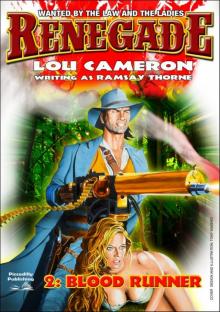 Blood Runner
Blood Runner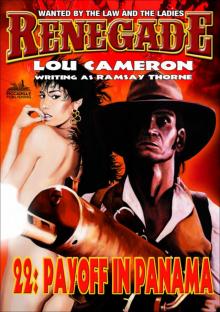 Renegade 22
Renegade 22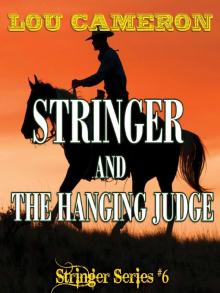 Stringer and the Hanging Judge
Stringer and the Hanging Judge Stringer and the Hell-Bound Herd
Stringer and the Hell-Bound Herd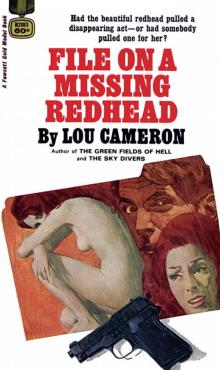 File on a Missing Redhead
File on a Missing Redhead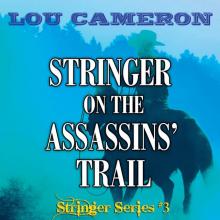 Stringer on the Assassins' Trail
Stringer on the Assassins' Trail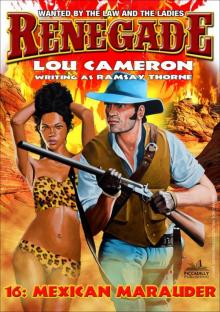 Mexican Marauder (A Captain Gringo Adventure #16)
Mexican Marauder (A Captain Gringo Adventure #16)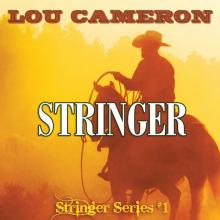 Stringer
Stringer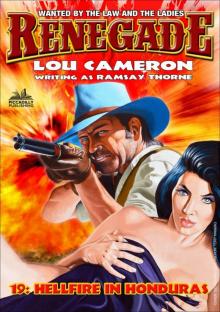 Renegade 19
Renegade 19 Stringer and the Oil Well Indians
Stringer and the Oil Well Indians Stringer and the Lost Tribe
Stringer and the Lost Tribe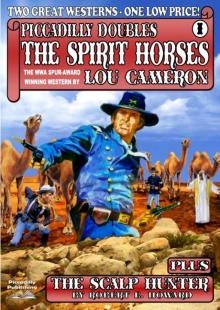 Piccadilly Doubles 1
Piccadilly Doubles 1 Stringer and the Border War
Stringer and the Border War Renegade
Renegade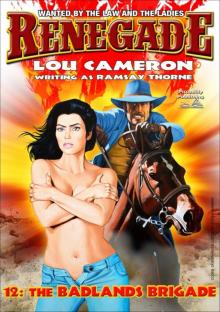 The Badlands Brigade (A Captain Gringo Adventure Book 12)
The Badlands Brigade (A Captain Gringo Adventure Book 12) Stringer and the Deadly Flood
Stringer and the Deadly Flood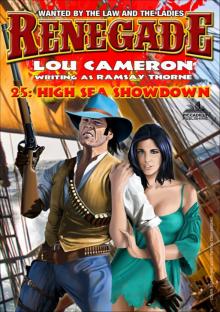 Renegade 25
Renegade 25 The Great Game (A Captain Gringo Western Book 10)
The Great Game (A Captain Gringo Western Book 10)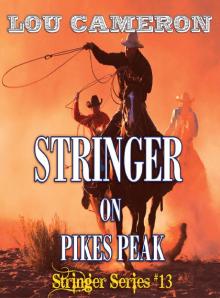 Stringer on Pikes Peak
Stringer on Pikes Peak